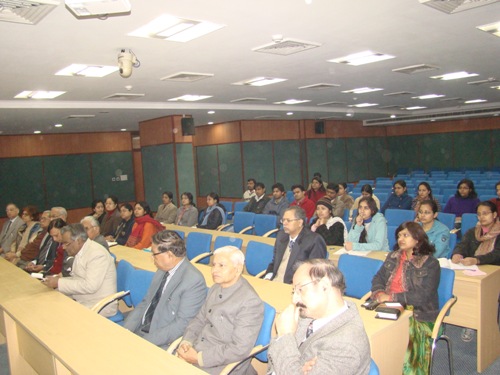03 Jan 2011|Noida | Amity University Campus, Sector-125 Noida
Amity Science, Technology & Innovation Foundation (ASTIF) organizes Lecture on “The Role of Biotechnology in Detection and Control of Animal Pathogens

A lecture on “The Role of Biotechnology in Detection and Control of Animal Pathogens" was organized by Amity Science, Technology & Innovation Foundation (ASTIF) at the Amity University Campus, Sector – 125, Noida.
Welcoming Dr. Sagar M. Goyal, Professor, Dept of Veterinary Population Medicine, College of Veterinary Medicine, University of Minnesota, USA, Prof. Dr. Sunil Saran, Sr. Vice Chairman, ASTIF, Amity International Center for Post Harvest Technology & Cold Chain Management informed that “the mission of Minnesota Veterinary Diagnostic Laboratory is to protect and promote animal and human health through early detection and monitoring of animal diseases. The Veterinary Diagnostic Laboratory (VDL) fulfills its mission by identifying emerging diseases, timely reporting of test results, developing new diagnostic methods, and training diagnosticians, veterinarians and graduate students.”
Presenting his lecture on “The Role of Biotechnology in Detection and Control of Animal Pathogens” Dr. Sagar M. Goyal, said that “for the purpose of disease control, it is important to identify, characterize and isolate the pathogens.” He added “Molecular diagnostics is the most useful method for characterization of micro organisms, for which culture or serologic tests are difficult or unavailable.” Talking about the impact of antigenic shift and drift on control strategies for Influenza virus, Dr. Goyal introduced the audience to its types such as Influenza A (human, swine, horse, mammals and birds), Influenza B (human and sometimes swine) and Influenza C (rare) and stated that “Influenza virus received attention only in 1918, when pigs and humans were sick at the same time and Influenza virus caused death of 40 million people. It was during 1930 – 1997 that H1N1 was identified and in the year of 1998 that H3N2 was discovered-which spread quickly in the swine population, the reason being lack of immunity due to the fact that the affected were vaccinated against H1N1 and further in 2000 other viruses like H1N2 had emerged.” Dwelling upon the importance of ‘Optimum Approach’ (the need of using both old and new technologies to get better and accurate answers of diagnostics) Dr. Goyal shared that “today there is great need for interdisciplinary collaborative research amongst the disciplines of Patho-Physiology, Virology and Immunology in order to ensure greater accuracy in pathogen identification”. Dr. Goyal said “Swine Influenza Viruses will continuously witness changes and our role would be to ensure National, Regional and State monitoring and develop effective vaccination accordingly.”
The lecture was followed by an interactive session between Dr.Goyal, students and faculty members of Amity Institute of Biotechnology, Amity Institute of Microbial Biotechnology, Amity Institute of Microbial Technology and Amity Institute of Pharmacy.
Also present during the lecture were Prof. Narayan Rishi, Director, Amity Institute of Virology and Immunology and Dr. Ajit Varma, Director General, Amity Institute of Microbial Technology.